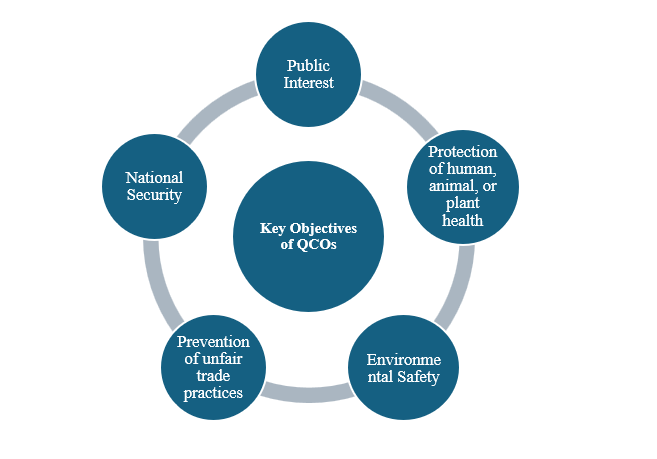BIS Amicus – September 2024 / Issue 3, as available here, delved into the key legal provisions of the BIS Act, 2016. Standing adjacent to the comprehensive regulatory framework of BIS are Indian Standards and Quality Control Orders that can have far-fetched implications for businesses manufacturing or importing goods and services in the Indian market.
In this article, we shall understand various provisions vis-à-vis the same.
What are Indian Standards? Are they mandatory to comply with?
Formulation of standards is one of the core activities of BIS. Indian Standards are defined under Section 10 of the BIS Act. In simple words, these are the specifications established by BIS, detailing the criteria for products, systems, and processes to meet. They cover a broad range of industries including electronics, chemicals, textiles, construction materials, and more.
So far, BIS has formulated more than 22,000 standards. These standards are periodically reviewed for carrying out any revision, amendment, reaffirmation, or withdrawal, as may be required.
Rule 15 (1) of the BIS Rules, 2018
“15. Establishment of Indian Standards. – (1) The Bureau shall establish Indian Standards in relation to any goods, article, process, system or service and shall reaffirm, amend, revise or withdraw Indian Standards so established as may be necessary, by a process of consultation with stakeholders who may include representatives of various interests such as consumers, regulatory and other Government bodies, industry, testing laboratories or calibration laboratories, scientists, technologists, and members of the Committees of the Bureau..”
A crucial question that comes up is – Who drafts these standards?
Under Rule 16 of the BIS Rules, the Bureau has been conferred upon the power to constitute Division Councils for the purpose of formulation of Indian Standards. Within these councils, specialised technical committees/sectional committees and sub-committees are formed, as may be considered necessary.
The rules also provide that these standards are voluntary, however, they may be binding if:
(a) it is stipulated in a contract;
(b) referred to in a legislation; or
(c) made mandatory by specific orders of the Government.
Let’s understand what these orders are all about.
Quality Control Orders (QCOs)
QCOs are issued by various Line Ministries (Regulators) under the Central Government to make compliance with certain Indian Standards mandatory for products. Such powers of the Government have been defined under Section 16 of the BIS Act, 2016. Products that are covered under the ambit of QCOs must bear a Standard Mark under a License or Certificate of Conformity (CoC) issued by the BIS, as per the relevant scheme of the BIS (Conformity Assessment) Regulations, 2018.
The date of commencement for these QCOs is explicitly provided in the order itself. For the benefit of micro and small enterprises, the enforcement date often varies across general enterprises, small enterprises, and micro enterprises.

Applicability on imported goods
In compliance with the provisions of the General Agreement on Tariffs and Trade (GATT), Agreement on Technical Barriers to Trade (WTO-TBT Agreement), and India’s Foreign Trade Policy, these QCOs apply, mutatis mutandis, to imports, unless specifically exempted.
Thus, foreign manufacturers, who wish to import such goods into India, shall also be required to obtain a License or CoC from BIS under the Foreign Manufacturers Certification Scheme (FMCS) of BIS.
Seeking exemptions from applicability of the QCOs
Clarifications pertaining to the applicability of the QCOs come under the purview of the respective Line Ministry who has issued the QCO. Additionally, many times, the QCO itself permits certain exemptions. For instance, the Copper (Quality Control) Order, 2023 explicitly provides that nothing in the order shall apply to goods or article meant for export purposes.
The Bolts, Nuts and Fasteners (Quality Control) Order, 2024, was also revised recently to include various such exemptions, making the scope and extent of the order much clearer for the stakeholders.
Objections with QCOs
QCOs are issued to promote consumer safety and product quality. In addition, they act as a non-tariff barrier to restrict low-quality imports into the country and facilitate the ‘Make in India’ programme.
Various writ petitions are often filed at the High Courts, advocating for withdrawal of QCOs for several reasons, depending on the facts and circumstances of the case. However, it must be noted that such petitions must be backed by appropriate reasoning and sufficient evidence to stand a chance in the court of law.
Case Law

In the above matter, vide an Order dated 8 January 2024, the Hon’ble High Court of Karnataka dismissed a writ petition filed by the Petitioner association, advocating for quash of the ‘Polyethylene Material for Moulding and Extrusion (Quality Control) Order, 2021’, dated 15 April 2021.
In the said order, the Hon’ble Court concluded that,
“if the quality emerges right from the word go, till the finished product, under the 'Make in India programme' it is only then that the country would be able to compete with others. A step towards that will not be interfered with by this Court except, that if the step towards that, depicts palpable and demonstrable arbitrariness, which is neither pleaded nor present…
… every raw material now that is sought to be brought under BIS is only to make it a quality final plastic product, for it would not become hazardous to the environment and be of use to the general public and meet health and safety standards including food conduct regulations, as they are widely used in every walk of human life.”
Thus, finding no merit in the petition, the Hon’ble High Court rejected the petition.

Conclusion
With the rapid pace of technological advancement, BIS will need to continuously update standards and mandate certification as may be required, especially in fields like artificial intelligence, cybersecurity, and electric vehicles.
The Bureau plays a vital role in protecting consumer interests, promoting quality assurance, and regulating industries in India. Through Standards and Quality Control Orders, it ensures that products in the market meet the necessary safety and quality requirements. In today’s fast-evolving market, where consumer awareness is growing and industries are innovating, the role of BIS will only become more crucial.
We strongly believe that staying informed about these standards not only empowers consumers but also boosts India’s economic growth by maintaining high-quality benchmarks for both domestic and global markets.





